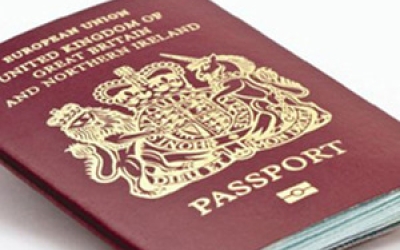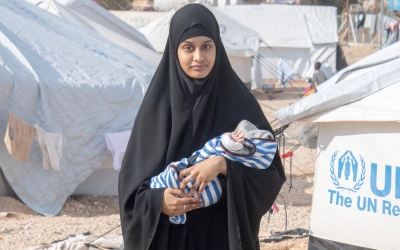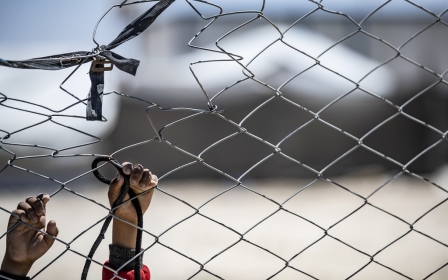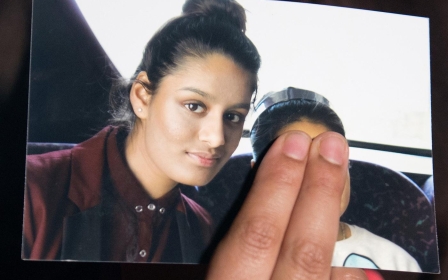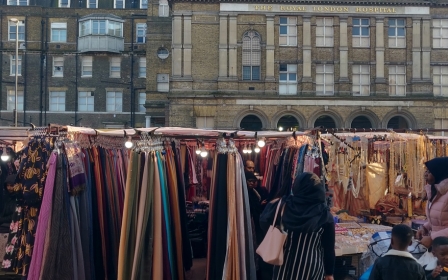Shamima Begum: UK must allow return to fight for citizenship, judges rule
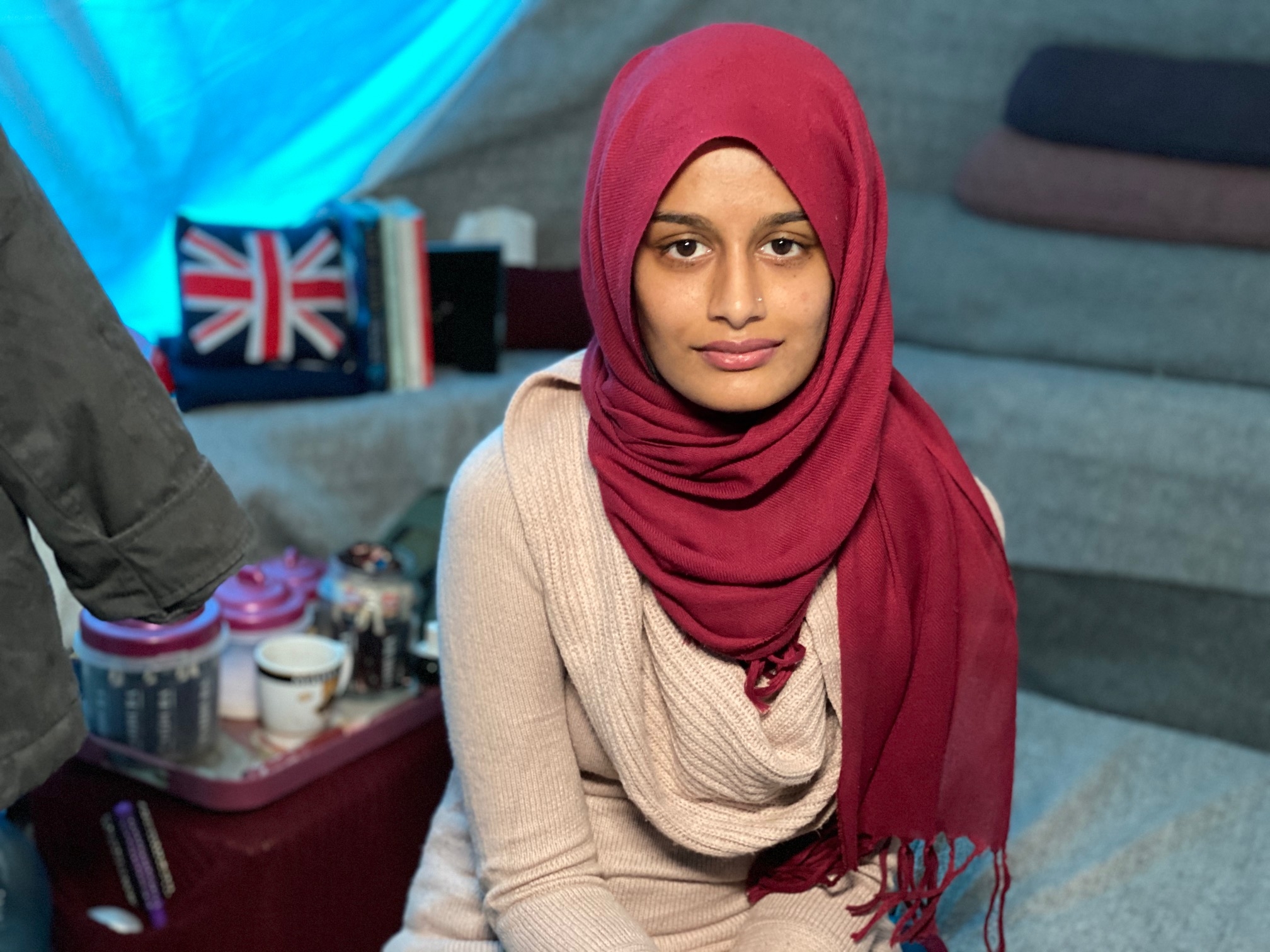
British judges ruled on Thursday that Shamima Begum, who joined the Islamic State group (IS) at the age of 15, should be allowed to return to the United Kingdom to contest the stripping of her citizenship.
Begum, now 20, absconded to IS-held Syria in 2015, along with Kadiza Sultana and Amira Abase, two other London schoolgirls who are both believed to be dead.
She was stripped of her citizenship in 2019 on security grounds after she was found in a detention camp for suspected IS members and their families in northern Syria by a journalist from the Times newspaper.
'The stripping of her citizenship without a chance to clear her name is not justice, it is the opposite'
- Daniel Furner, Begum's solicitor
Reacting to the Court of Appeal's ruling, her solicitor Daniel Furner said: "Ms Begum has never had a fair opportunity to give her side of the story. She is not afraid of facing British justice, she welcomes it. But the stripping of her citizenship without a chance to clear her name is not justice, it is the opposite."
Having the right to return to the UK does not mean she can make the journey, however. The British government repatriated a number of orphaned children in November but it has otherwise shown no interest in repatriating other British nationals suspected of having joined IS or who were taken to live under the militant group as children or been born in territory under its control.
Many others, like Begum, have also been stripped of their British citizenship.
Meanwhile, pending her appeal Begum is not a British citizen, and as such has no legal right to enter the country. The Court of Appeal said Begum would live under any controls Home Secretary Priti Patel would see fit, were she to return.
Begum challenged then-Home Secretary Sajid Javid's decision to deny her citizenship, arguing that it was unlawful because she was not eligible for Bangladeshi nationality, as suggested.
The UK and citizenship-stripping powers
+ Show - HideThe UK has been described by researchers as a “global leader in using citizenship deprivation as a counterterrorism measure”.
Historic citizenship-stripping powers targeted at naturalised citizens on disloyalty grounds had largely fallen into disuse prior to 2002, when the government introduced new measures in an attempt to revoke the citizenship of Abu Hamza, an Egyptian-born cleric subsequently convicted of terrorism in the US.
The 2002 legislation allowed for British-born nationals as well as naturalised citizens to lose their nationality rights. Successive governments gradually broadened the scope of the powers so that home secretaries can now deprive anyone of citizenship if they are satisfied that doing so is “conducive to the public good” and would not leave an individual stateless.
No criminal conviction is required. Letters often state that individuals have been assessed as presenting “a risk to the national security of the United Kingdom”.
The government’s use of the powers surged to unprecedented levels in response to the perceived threat posed by British nationals returning from Syria.
Between 2010 and 2015, 33 people were stripped of their citizenship, according to Home Office figures. In 2016, 14 people were deprived, and in 2017 the number jumped to 104.
In 2018, the figure was 21, and in in 2019 - when Shamima Begum was among those targeted - it was 27. It then dropped to ten in 2020 and eight in 2021.
Some subjects of citizenship-stripping orders argue that they have been left effectively stateless, because the government bases its assessment that they are dual nationals on a right of citizenship to a parent’s country of birth, even if they have never taken up that citizenship or even visited the country.
In some cases the Special Immigration Appeals Commission, which rules on citizenship cases, has agreed: it has ruled in favour of British nationals of Bangladeshi descent on the grounds that Bangladesh does not consider them citizens if they have not claimed Bangladeshi nationality before the age of 21.
Human rights organisations and lawyers have compared the powers to “medieval exile and banishment”. Critics also point out that the powers create a two-tier system in which only those deemed to be dual nationals are at risk of losing their British citizenship; a measure that discriminates against naturalised citizens, immigrants and their children.
Bangladesh has said it will not allow Begum entry, and has no rights to the country's citizenship. She has never visited Bangladesh. Governments cannot strip citizenship of nationals who only qualify for one nationality under international law.
Begum's lawyers argued that she was unable to properly defend herself stranded in detention in Syria, a situation in which she could not properly correspond with her legal team.
The Special Immigration Appeals Commission (SIAC) originally ruled that Javid's decision to revoke her British citizenship in February 2019 did not make her stateless, as she was eligible through her mother.
However, the Court of Appeals has now partially overturned that decision, allowing Begum to return and argue her case.
"I have reached the firm conclusion that given that the only way in which she can have a fair and effective appeal is to be permitted to come into the United Kingdom to pursue her appeal," Julian Flaux, the judge, wrote in a ruling.
"Fairness and justice must, on the facts of this case, outweigh the national security concerns... I consider that Ms Begum’s claim for judicial review of the decision of SIAC... succeeds."
In the ruling, Flaux said the SIAC had not properly considered the risks that Begum may face if left to authorities in Bangladesh or Iraq, which has carried out executions of those accused of being part of IS.
"I do not consider that SIAC considered the evidence on behalf of Ms Begum on risk of transfer to Iraq and Bangladesh and mistreatment there or if it did it discounted it," he wrote.
Lawyers and human rights campaigners say that the ruling could have implications for others targeted by citizenship revocation orders, many of whom have appeals pending but are unable to return to the UK.
They said it meant SIAC would need to give consideration to whether those targeted were at risk of torture or unlawful killing, and whether a fair and effective appeal could be held if an appellant was stranded abroad.
"This decision will have momentous implications for others seeking to appeal their deprivation of citizenship from the northeast Syrian camps," Gretta Schumacher, senior legal and policy officer at the Rights and Security International campaign group, told MEE.
Schumacher said there were up to 20 British women and children stranded in the camps in similar circumstances and the UK government had engaged in an aggressive policy of depriving them of citizenship, even in circumstances in which they were effectively rendered stateless.
"The Court was clear and unflinching in its support for the fundamental principles of justice and fairness in the context of these decisions. It also made clear that it would not accept the Government’s preferred outcome – which is to leave them, stranded, in cruel and inhuman conditions, with no prospect of their detention ending or their situation being resolved, indefinitely."
Citizenship-stripping powers have been widely used against British nationals who travelled to Syria since the start of the country's civil war in 2011 amid concerns about the threat posed by returnees.
Just 14 people were stripped of citizenship in 2016, but the number rose to 104 in 2017. A further 21 people were deprived of citizenship in 2018 according to the latest government figures.
Muhammad Rabbani, managing director of campaign group Cage, said: “We can only hope that this judgment may offer a pathway and practical avenues to manage the return of British nationals who are currently stuck in prison camps in Syria and Iraq.”
However lawyers cautioned that the judgment was framed in a way that was specific to Begum's circumstances, rather than applicable more widely.
The UK's Home Office criticised the ruling. "This is a very disappointing decision by the court. We will now apply for permission to appeal this judgment, and to stay its effects pending any onward appeal," a spokeswoman said.
"The government’s top priority remains maintaining our national security and keeping the public safe."
Middle East Eye propose une couverture et une analyse indépendantes et incomparables du Moyen-Orient, de l’Afrique du Nord et d’autres régions du monde. Pour en savoir plus sur la reprise de ce contenu et les frais qui s’appliquent, veuillez remplir ce formulaire [en anglais]. Pour en savoir plus sur MEE, cliquez ici [en anglais].


